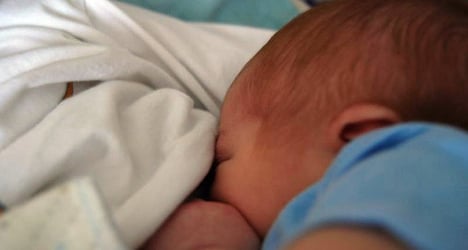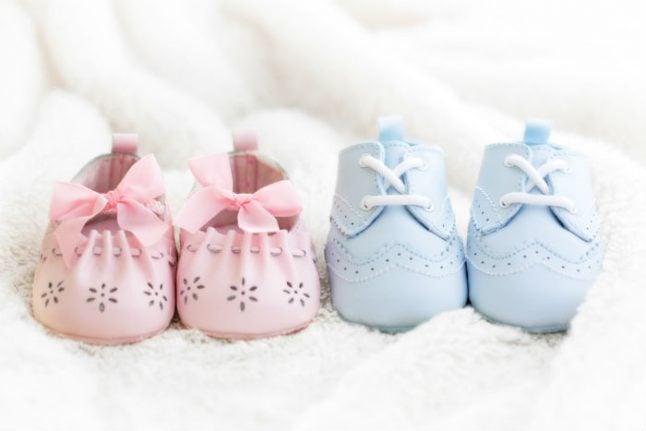A 29-year-old nurse describing herself as a “mother in full health” has caused a stir in France by posting a classified ad online, putting her own breasts up for rent to feed newborn babies.
What’s more, the unorthodox entrepreneur appears to be specifically targeting gay men, who are now allowed to adopt children after France's divisive gay marriage bill was voted in earlier this year.
The ad by “cecilia232” on the French website e-loue.com is entitled “Breast rental – breastfeeding – Boulogne”, a neighbourhood on the outskirts of Paris where ‘Cecilia’ lives.
“I am a young mother in full health, a trained nurse, 29 years old, and I’m renting out my breasts to feed young babies. In one day I can offer you up to a dozen feeds for your baby,” the post continues.
“Gay men in couples are not able to breastfeed their babies…Breastfeeding allows babies to be in good health. Basically, breast milk gives them complete nutrition,” she adds.
“Contact me through the site. Don’t bother if you’re not serious,” Cecilia concludes.
'Everything is up for rent!' Or is it?
What’s the going rate for a full day’s worth of breastfeeding? For her part, anyway, Cecilia is charging €100 per day, and the e-loue.com site allows a potential customer to block-book her breasts using a drop-down calendar.
According to Terrafemina, a French website focusing on women’s issues, e-loue.com’s moderators contacted “cecilia232” to confirm the sincerity of her post before publishing it.
Thus fulfilling the true meaning of the website’s motto: “With e-loue, everything is up for rent!”
Article L2323-1 of France’s public health code, however, would appear to disagree.
“The collection, preparation…and distribution of breast milk…is covered by milk banks managed by public health establishments, public authorities or non-profit organizations…” says the law, which seems to expressly forbid what Cecilia proposes in her post.
For his part, however, e-loue.com director Alexandre Woog claims to have performed his own due diligence on Cecilia’s ad.
“Our legal team told us it was legal,” he told BFMTV.
Cecilia's offer appears to have been a success so far. According to Woog, she has received around 15 interested responses. He did, however, warn Cecilia to be careful who her ad might attract.
"She might still have to do some sorting [of responses]. Some people may not have read the message properly and as a result, she may have some men making a booking for a different reason," he joked.
Risk of HIV and meningitis infection
While e-loue.com's director might see a reason to laugh, Cecilia's actions have drawn fierce criticism from others.
“Aside from its opportunistic and abberant nature, her offer turns out to be illegal and a danger to the health of newborn babies,” said Marie-Laure Makouke in a column on the Terrafemina website.
While Cecilia’s offer to personally breastfeed babies herself appears to be a novel development, the sale and sharing of breast milk on online black markets is nothing new.
In 2011, two leading French experts warned mothers about the serious health risks associated with giving their babies unregulated breast milk sourced through sites like Facebook.
“These risks are mainly infectious, because the milk can be contaminated by bacteria or viruses,” including HIV and meningitis, said Professor Jean-Charles Picaud, president of the French Association of Human Milk Banks, and Professor Pierre-Henri Jarreau, president of the French Society of Neonatalogy, in a joint statement.
The ad will no doubt hand ammunition to those opponents of legalising gay marriage and adoption in France who had claimed the law would lead to women's bodies being put up for rent.
The French government has said it plans to put a bill before parliament by the end of this year that would legalise Medically Assisted Procreation (PMA) for gay couples, in what looks set to spark more fiery debate and protests.
However the government has ruled out any plan to legalise surrogacy, which has remained illegal since 1991.
New rights and new complications for gay couples
This isn’t the first business venture in recent months to target gay families as an emerging market in France.
Back in February, three months before gay marriage was actually signed into law, The Local reported how two enterprising businessmen had set up the website “Divorce-Gay.fr” to cater to the needs of gay couples whose dream ends in heartbreak.
"As gays and lesbians gain new rights and freedoms, this also creates new complications and difficulties – legal, financial, and to do with inheritance – that up to now only heterosexuals experienced," said the site.
In April, just days after France’s National Assembly voted to legalize gay marriage, The Local reported how “The G-Day” – a high-end wedding boutique dedicated to gay men – was set to open in Paris.
“Are you a couple? Do you want to get married, or are you simply curious to know what could be on offer, and haven’t had the chance to think about it yet? Then G-Day was made for you,” said the salon’s website.




 Please whitelist us to continue reading.
Please whitelist us to continue reading.
Member comments